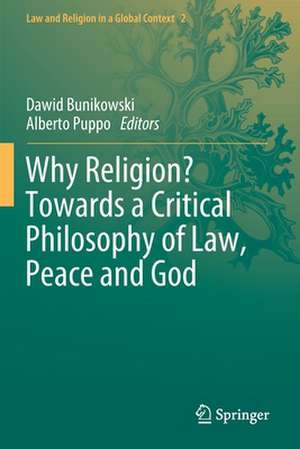Why Religion? Towards a Critical Philosophy of Law, Peace and God: Law and Religion in a Global Context, cartea 2
Editat de Dawid Bunikowski, Alberto Puppoen Limba Engleză Paperback – 12 feb 2021
The book follows the structure of interdisciplinary research in which the international legal scholar, the moral philosopher, the philosopher of religion, the theologian, and the political scientist contribute to the construction of the necessary bridges. Moreover, it gives voice to different monotheistic traditions and, more importantly, it analyses religion in the various dimensions in which it determines the authors' cultures: as a set of rituals, as a source of moral norms, as a universal project for peace, and as a political discourse.
| Toate formatele și edițiile | Preț | Express |
|---|---|---|
| Paperback (1) | 890.85 lei 6-8 săpt. | |
| Springer International Publishing – 12 feb 2021 | 890.85 lei 6-8 săpt. | |
| Hardback (1) | 896.84 lei 6-8 săpt. | |
| Springer International Publishing – 12 feb 2020 | 896.84 lei 6-8 săpt. |
Preț: 890.85 lei
Preț vechi: 1086.40 lei
-18% Nou
Puncte Express: 1336
Preț estimativ în valută:
170.46€ • 178.45$ • 141.05£
170.46€ • 178.45$ • 141.05£
Carte tipărită la comandă
Livrare economică 05-19 aprilie
Preluare comenzi: 021 569.72.76
Specificații
ISBN-13: 9783030354862
ISBN-10: 3030354865
Ilustrații: XII, 297 p. 4 illus., 2 illus. in color.
Dimensiuni: 155 x 235 mm
Greutate: 0.44 kg
Ediția:1st ed. 2020
Editura: Springer International Publishing
Colecția Springer
Seria Law and Religion in a Global Context
Locul publicării:Cham, Switzerland
ISBN-10: 3030354865
Ilustrații: XII, 297 p. 4 illus., 2 illus. in color.
Dimensiuni: 155 x 235 mm
Greutate: 0.44 kg
Ediția:1st ed. 2020
Editura: Springer International Publishing
Colecția Springer
Seria Law and Religion in a Global Context
Locul publicării:Cham, Switzerland
Cuprins
Part I: Peace Through Religion in Moral Philosophy and Natural Law.- Chapter 1 Jurisprudence is About Both Divine and Human Things.- Chapter 2 Domestic Peace as Social Justice.- Chapter 3 Philosophical and Theological Aspects in the Thought of Johannes Althusius.- Chapter 4 Living Well Together: Insights from a Philosopher, a Theologian and a Legal Scholar.- Part II: Secular Peace Through Universal Religions.-
Chapter 5 A Theological Justification for Freedom of Religion and Belief as a Universal Right.- Chapter 6 Islam, Europe, and the Problem of Peace.- Chapter 7 Humanity as the Ground for Universal Human Rights in Islamic Law.- Part III: Peace and Religious Beliefs in International Jurisprudence.- Chapter 8 The Sollen as Otherwise than Being: Notes on Hermann Cohen, Hans Kelsen and Emmanuel Lévinas.- Chapter 9 From Rosa Luxemburg to Hersch Lauterpacht: An Ostjüdische Heritage in International Law?.- Chapter 10 Law, Secularism, and the Evolution of the ‘Human’ in International Legal Discourse and Global Governance.- Part IV: The Political/Religious Dimension of Dramatic Social Events.- Chapter 11 Blake’s Dialectical Theism.- Chapter 12 Some Remarks on “Adulthood” in Walter Benjamin’s Experience and Poverty.- Chapter 13 The Dreyfus Affair and the Rise of Political Religion in France.Notă biografică
Dawid Bunikowski, born in northern Poland, residing in Finnish North Karelia, has a Doctor of Law (from Nicolaus Copernicus University). He is a philosopher of law and pursues cross-disciplinary research. He cooperates with the University of the Arctic (as Leader of the Sub-group of Philosophy of Law), Cardiff Centre for Law and Religion and the University of Eastern Finland. His research interests include legal theory, law and morality, law and religion.
Alberto Puppo is Professor of Legal Theory at the ITAM Law School (México). He holds a doctorate in Analytical Philosophy and General Theory of Law from the University of Milan. He is the author of Acceptation et normativité: la force du devoir dans le discours juridique and the co-author, with Sévane Garibian, of Normas, valores, poderes. Ensayos sobre positivismo y derecho internacional. His main field of interest is international legal theory, especially Kelsen’s theory.
Textul de pe ultima copertă
This book examines the relation between religion and jurisprudence, God, and peace respectively. It argues that in order to elucidate the possible role religion can play in the contemporary world, it is useful to analyse religion by associating it with other concepts. Why peace? Because peace is probably the greatest promise made by religions and the greatest concern in the contemporary world. Why jurisprudence? Because, quoting Kelsen’s famous book "Peace through Law", peace is usually understood as something achievable by international legal instruments. But what if we replace "Peace through Law" with "Peace through Religion"? Does law, as an instrument for achieving peace, incorporate a religious dimension? Is law, ultimately, a religious and normative construction oriented to peace, to the protection of humanity, in order to keep humans from the violence of nature? Is the hope for peace rational, or just a question of faith? Is religion itself a question of faith or a rationalchoice? Is the relatively recent legal concept of “responsibility to protect” a secular expression of the oldest duty of humankind?
The book follows the structure of interdisciplinary research in which the international legal scholar, the moral philosopher, the philosopher of religion, the theologian, and the political scientist contribute to the construction of the necessary bridges. Moreover, it gives voice to different monotheistic traditions and, more importantly, it analyses religion in the various dimensions in which it determines the authors' cultures: as a set of rituals, as a source of moral norms, as a universal project for peace, and as a political discourse.
Caracteristici
Presents a critical and constructive approach to God and peace Offers a refreshing analysis of natural law theory and religious standpoints Shows the connection between religious beliefs and wars



